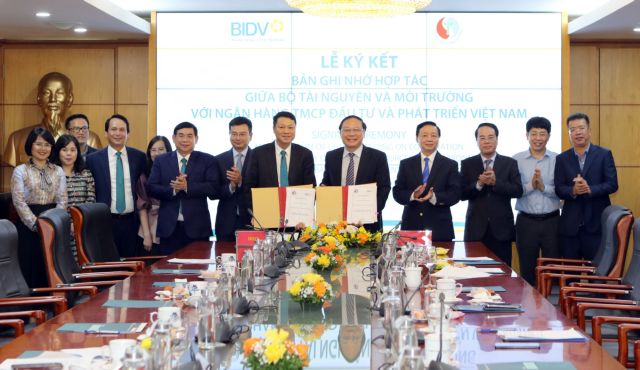Le Cong Thanh, deputy minister of the Ministry of Natural Resources and Environment (MONRE) and Le Ngoc Lam, BIDV’s Chief Executive Officer, last week signed a Memorandum of Understanding (MOU) on cooperation in promoting green finance, sustainable development, environmental protection and response to climate change.

Le Cong Thanh, deputy minister of the Ministry of Natural Resources and Environment (MONRE) and Le Ngoc Lam, BIDV’s Chief Executive Officer, last week signed a Memorandum of Understanding (MOU) on cooperation in promoting green finance, sustainable development, environmental protection and response to climate change.
Addressing the signing ceremony, Minister of MONRE Tran Hong Ha said that the cooperation in the fields of natural resources, environment and climate change will promote the formation and development of green bonds, green credit, and carbon market; facilitate businesses’ participation in activities aimed at protecting the environment, responding to climate change, and economic development towards low-carbon.
Under the MoU, MONRE will also support BIDV to strengthen its capability in environmental risk assessment and to develop criteria for environmental risk assessment on projects – the prerequisite for the development of sustainable financial products following international practices and suitable for the Vietnamese market.
BIDV Chairman of the Board of Directors Phan Duc Tu said: “BIDV is a State-owned commercial bank that always pursues a sustainable development strategy with high social responsibility. BIDV has actively been implementing important transition plans for itself and for customers, toward a sustainable future.
"The MoU will send out positive signals about opportunities for companionship and partnership between regulators, commercial banks and the business community in shaping the market development direction, formulating solutions and actions to tackle issues of environmental protection and climate change response, which will be strategic priorities in the fields of business, finance and banking, contributing to the effective delivery of the green strategy as well as the international commitments that Viet Nam has signed.”
In recent years, climate change is considered a serious challenge on a global scale, particularly for developing countries, which are vulnerable to and heavily affected by climate change, such as Viet Nam. At the COP26 held in November 2021 in the UK, the Prime Minister Pham Minh Chinh made a commitment to achieving net-zero emissions by 2050; while making several initiatives that showed Viet Nam’s determination and responsibility to work alongside the international communities in efforts to respond to global climate change.
The timely implementation of Viet Nam's commitments at COP26 will bring great and long-term benefits to the country's sustainable development. Nevertheless, it also requires large financial resources and efficient coordination between the regulators and the business community. Against that backdrop, the role of the financial-banking sector should be promoted as a lever and catalyst for actions and projects to address climate and sustainability challenges. — VNS





